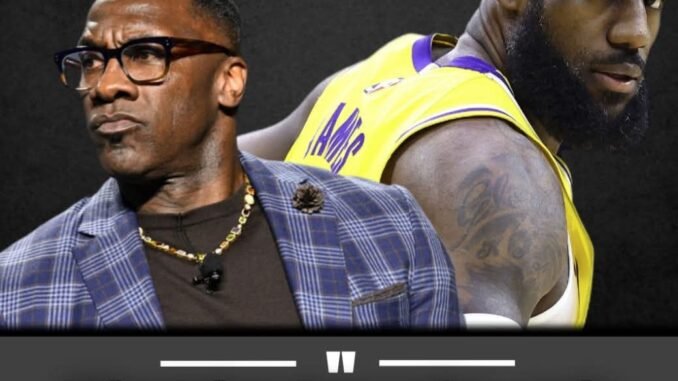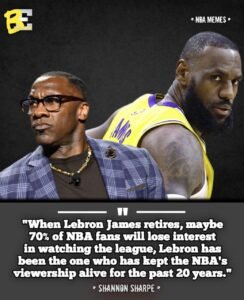
Shannon Sharpe’s Bold Claim Sparks Debate About the NBA’s Future in a Post-LeBron Era
For two decades, one name has towered above the NBA landscape like a colossus — LeBron James. From the moment he stepped onto an NBA court in 2003 as an 18-year-old phenom straight out of high school, LeBron has been more than just a basketball player. He’s been a cultural icon, a global ambassador for the sport, and perhaps the league’s most influential figure since Michael Jordan. And now, as whispers of retirement begin to creep into conversations about his legacy, fans and analysts alike are beginning to ask a chilling question: What happens to the NBA when LeBron James walks away?
No one framed that concern more powerfully than Shannon Sharpe, the former NFL star turned sports commentator, who recently said:
“When LeBron James retires, maybe 70% of NBA fans will lose interest in watching the league. LeBron has been the one who has kept the NBA’s viewership alive for the past 20 years.”
It’s a bold statement — one that has already sparked heated debate across social media, sports talk shows, and barbershops worldwide. But is it true? Has LeBron really carried the NBA’s popularity on his shoulders for two full decades? And more importantly, what will the league look like when he’s no longer in uniform?

LeBron’s Impact by the Numbers
Let’s begin with some facts. LeBron James is the all-time leading scorer in NBA history. He’s made 10 NBA Finals appearances, won four championships, and earned four MVPs. But beyond the accolades, it’s his consistency, longevity, and adaptability that have kept him at the center of the NBA universe.
Viewership data has often mirrored LeBron’s career trajectory. The NBA Finals with the highest ratings of the post-Jordan era? The Cavaliers-Warriors battles, starring none other than LeBron James. Social media engagement during games? LeBron’s name often tops trending lists. Merchandise sales? He’s consistently among the top-selling jerseys year after year.
And it’s not just domestic viewership. LeBron’s name resonates globally. From China to Europe to Africa, he’s a familiar face and a magnet for international fans. The NBA’s efforts to globalize have been significantly boosted by the star power and marketability of LeBron James.
Shannon Sharpe’s 70% Claim — Exaggeration or Truth?
Sharpe’s claim that “70% of NBA fans will lose interest” may seem like an overstatement, but the emotional weight behind it rings true. LeBron represents more than basketball. He’s a storyline unto himself — a living legend who has managed to stay relevant, if not dominant, into his 40s. He’s the kind of player fans grow up with, pass on to their kids, and stay glued to the screen for, night after night.
While 70% might be hyperbole, the reality is that a substantial portion of fans — especially casual viewers — tune in specifically to watch LeBron. The “LeBron effect” is real. It’s been evident every time he switches teams, bringing millions of fans along with him — from Cleveland to Miami, back to Cleveland, and now to Los Angeles.
His presence also elevates lesser-known players and boosts matchups that would otherwise fly under the radar. A game between the Lakers and a struggling franchise still draws national attention if LeBron is on the court.
A League in Transition
To be fair, the NBA is not devoid of talent. Players like Giannis Antetokounmpo, Luka Dončić, Jayson Tatum, and Victor Wembanyama represent the future. The league is loaded with young, marketable stars ready to take the baton. But none — at least not yet — command the gravitational pull that LeBron does.
The question is whether the NBA has done enough to prepare for a post-LeBron reality. There were similar concerns after Michael Jordan retired, and the league endured a transitional phase before stars like Kobe Bryant, Shaquille O’Neal, and eventually LeBron himself brought it back to prominence.
The NBA has become smarter about branding and storytelling, using social media, streaming platforms, and global outreach to engage younger audiences. But sustaining viewership will depend heavily on creating rivalries, marketing stars, and delivering compelling narratives — something LeBron has done effortlessly by simply being himself.
What Lies Ahead
Whether LeBron retires in 2025 or pushes it a few more years, his exit will mark the end of an era. The NBA’s challenge will be not just to replace a superstar, but to fill the void of a cultural force who changed how basketball is consumed, discussed, and admired.
The new generation of fans grew up in the “LeBron era.” They saw him redefine player empowerment, speak out on social issues, build businesses, act in films, and still drop 30 points a night. That’s not something easily replaced.
For fans, the end of LeBron’s playing days will feel like the closing chapter of a once-in-a-lifetime story. For the NBA, it’s a test of endurance and reinvention.
Final Thoughts
Shannon Sharpe may have lit the match, but the fire was always there. The NBA will undoubtedly continue — it always does. But make no mistake: when LeBron James retires, the landscape of the league will change dramatically. The cameras will still roll, the arenas will still fill, and the game will go on — but the absence of its brightest star will be felt everywhere.
Because for the last 20 years, LeBron James hasn’t just played in the NBA — he has been the NBA.
Leave a Reply